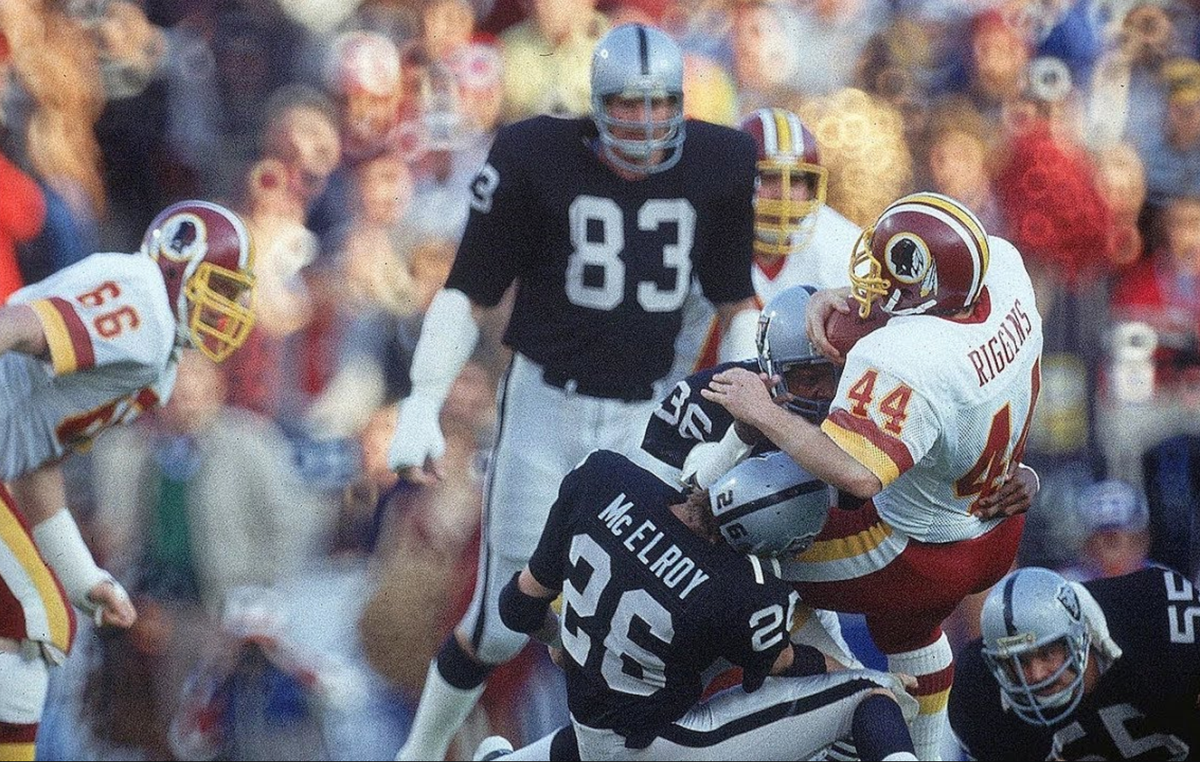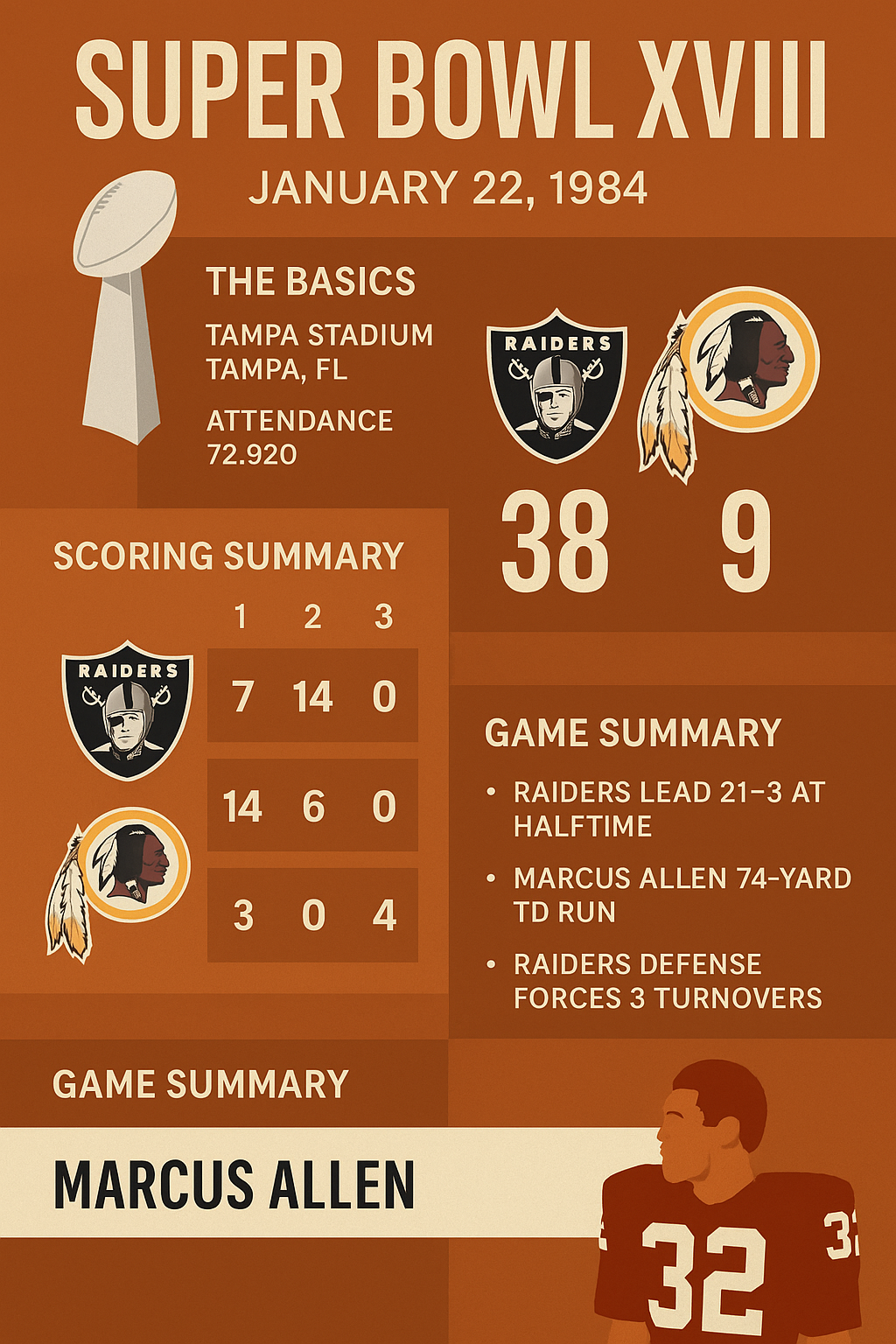Super Bowl XVIII: The Raiders Obliterate the Redskins in a Statement of Power

On January 22, 1984, the Los Angeles Raiders stormed into Tampa Stadium and delivered one of the most dominant performances in Super Bowl history, dismantling the defending champion Washington Redskins by a score of 38–9 in Super Bowl XVIII. This wasn’t just a game—it was an ambush, a carefully orchestrated demolition of the most potent offense in the league. For Los Angeles, it marked a second Super Bowl title for the franchise and the first since their controversial move from Oakland. For Washington, it was a stunning collapse, and for football fans, it was a masterclass in physical dominance and execution.
Pre-Game Context: Clash of Juggernauts
Super Bowl XVIII was supposed to be a showdown between two powerhouses. The Redskins, led by head coach Joe Gibbs, had steamrolled their way through the 1983 season with a 14–2 record and had scored a then-NFL record 541 points behind quarterback Joe Theismann, running back John Riggins, and the “Fun Bunch” receiving corps. They had already won Super Bowl XVII the year prior and were considered by many as a budding dynasty.
The Raiders, on the other hand, had moved to Los Angeles just two years prior. Under fiery owner Al Davis and head coach Tom Flores, they compiled a 12–4 regular season record and a dominant playoff run, crushing the Steelers and then the Seahawks. Their offense was led by the rocket-armed Jim Plunkett, while their defense—anchored by Howie Long, Matt Millen, and Lester Hayes—was aggressive and unforgiving.
“Heading into Super Bowl XVIII, most people expected fireworks,” said Dr. Brian Kole, lead historian at the Super Bowl Historical Society. “What they got was a blowtorch from the Raiders and a total system shutdown for the Redskins.”
The Venue: Tampa in the Spotlight
Tampa Stadium hosted its first Super Bowl in what would become a long relationship between the NFL and the city. Weather was warm and sunny, and over 72,000 fans packed the stadium.
CBS broadcast the game, with Pat Summerall and John Madden providing legendary commentary. The halftime show featured the theme “Salute to Superstars of the Silver Screen,” with performances by the Florida State University Marching Chiefs.
This was also the first Super Bowl to feature national closed captioning, a step forward in accessibility for millions of viewers.
First Half: Raiders Land the First Blow—and Then Keep Swinging
From the first whistle, the Raiders made it clear they came to dominate. On Washington’s opening drive, linebacker Jack Squirek set the tone with a crushing hit on Theismann. The Raiders then capitalized with a 12-yard touchdown run from fullback Derrick Jensen on a blocked punt—the first blocked punt touchdown in Super Bowl history.
The Redskins responded with a field goal, but the Raiders struck again. Plunkett connected with Cliff Branch and Todd Christensen to drive downfield, setting up a 1-yard touchdown run by Marcus Allen, the explosive second-year back from USC.
Just before halftime, came the play that sealed Washington’s fate: with 12 seconds left and backed up near their own goal line, Theismann threw a screen pass that was intercepted by Jack Squirek and returned 5 yards for a touchdown. Instead of entering the half down one score, the Redskins were now trailing 21–3.
“The Squirek pick was the dagger. It flipped the psychology of the game,” said Margo Sullivan, curator at the Super Bowl Historical Society. “Suddenly, Washington wasn’t defending a title—they were trying to survive.”
Second Half: Marcus Allen Ascends
If the first half belonged to the Raiders’ defense, the second belonged to Marcus Allen.
After Washington narrowed the gap with a field goal (21–9), the Raiders turned to Allen to control the clock and deliver the knockout blow. He didn’t disappoint.
In the third quarter, Allen took a handoff, spun through the line, reversed field, and raced 74 yards through a stunned Redskins defense for one of the most iconic runs in Super Bowl history. He slashed through defenders, accelerated like a track star, and glanced over his shoulder as he crossed the end zone.
That run made it Raiders 35, Redskins 9, and it effectively ended the contest. The only drama left was watching Allen rack up yardage and the Raiders chase history.
Final Score
- Los Angeles Raiders: 38
- Washington Redskins: 9
The 29-point margin of victory was the largest in Super Bowl history at the time and remains one of the biggest blowouts ever.

MVP and Notable Performances
Marcus Allen was named Super Bowl XVIII MVP with a legendary performance:
- 20 carries
- 191 rushing yards (then a Super Bowl record)
- 2 touchdowns
- Countless broken tackles and highlight moments
Other standouts included:
- Jim Plunkett: 16/25, 172 yards, 1 TD
- Cliff Branch: 6 receptions, 94 yards, 1 TD
- Jack Squirek: 1 INT, 1 TD
- Lester Hayes & Mike Haynes: Locked down Washington’s receivers
- Raiders Defense: 5 sacks, 3 turnovers, 0 TDs allowed
For Washington:
- Joe Theismann: 16/35, 243 yards, 2 INTs, no touchdowns
- John Riggins: 26 carries, 64 yards
- Art Monk: 5 receptions, 104 yards—but most in garbage time
Coaching and Scheme: Flores Outclasses Gibbs
Tom Flores, already the first minority head coach to win a Super Bowl with Oakland in 1980, became the first to win two. His game plan was simple but brilliant: keep Washington off balance, control the line, and let Allen loose.
Defensively, coordinator Charlie Sumner designed blitz-heavy pressure packages that confused Theismann and bottled up Riggins.
Meanwhile, Washington appeared flat. Joe Gibbs later admitted that his team was uncharacteristically tight, and they never adjusted to the Raiders’ speed and physicality.
Strategic Takeaways
- Special Teams Matter: The blocked punt touchdown set the tone early and gave the Raiders confidence.
- Turnover Margin: L.A. won the turnover battle 3–0.
- Run-to-Win: The Raiders ran for 231 yards; Washington had just 90.
Cultural and Historical Impact
Super Bowl XVIII was more than a title game. It was a vindication for Al Davis, who had battled the NFL in court over the franchise’s relocation to Los Angeles. Watching his team dominate the defending champions on national television was, in many ways, his ultimate revenge.
Marcus Allen’s performance elevated him from promising back to national superstar. His vision, agility, and speed became the prototype for modern all-purpose backs.
The game also signaled a shift in Super Bowl momentum. While the NFC had begun to dominate in prior years, the Raiders’ win gave the AFC a needed boost in credibility. Ironically, the NFC would go on to win 13 of the next 16 Super Bowls.
For Washington, the loss was a harsh lesson. Theismann was never quite the same, and while the Redskins would return and win Super Bowls XXII and XXVI under Gibbs, the aura of invincibility was gone.
Broadcast and Records
Super Bowl XVIII was a ratings success, drawing 77.6 million viewers, and showcasing CBS’s broadcast excellence. The NFL Today pregame show with Brent Musburger, Irv Cross, and Jimmy "The Greek" Snyder was a fan favorite.
Fun fact: this Super Bowl was the first time that the MVP trophy presentation was held on the field, setting a new standard for postgame ceremonies.
Legacy
The Los Angeles Raiders became the first team to win Super Bowls representing two different cities. They also became the second wild card team in history to win it all, following their own feat in Super Bowl XV.
Tom Flores’ coaching legacy was finally cemented, though it would take decades before his Hall of Fame induction—a delay many viewed as unjust.
The Squirek pick-six, Allen’s 74-yard run, and the sheer shock of the lopsided score remain etched in Super Bowl folklore.
“Super Bowl XVIII is the perfect game to show someone what dominance looks like,” said Dr. Kole. “It wasn’t one moment—it was an avalanche. A four-quarter statement by a franchise that knew exactly who they were.”
Final Word
Super Bowl XVIII wasn’t close. It wasn’t dramatic. It wasn’t down to the wire. But it was important. It was a reminder that in football, preparation, toughness, and attitude matter just as much as talent.
The Raiders came in as underdogs and walked out as champions—angry, aggressive, and unforgettable.
Their message to the league?
“Just Win, Baby.” And that day, they did.